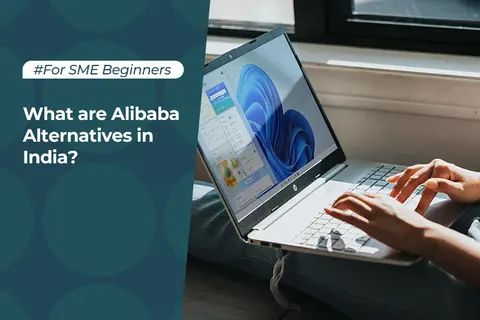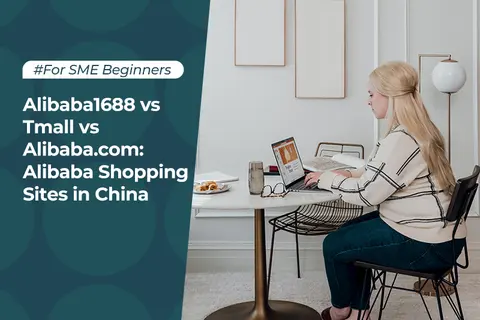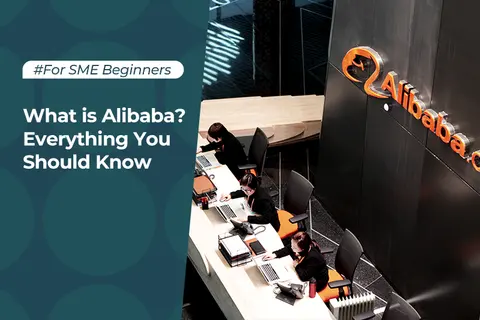What are Chovm Alternatives in India?

Table of Contents
Overview of Chovm's Role in E-commerce
-
Chovm, founded in 1999 by Jack Ma and a group of 17 co-founders, has grown from a small internet startup to one of the world's largest e-commerce companies. Its primary mission was to make it easy to do business anywhere, which it achieved by connecting Chinese manufacturers with global buyers. The company initially focused on creating a B2B marketplace, Chovm.com, where businesses could buy and sell products internationally. This platform revolutionized how companies approached sourcing and procurement, significantly reducing the barriers to entering global markets for small and medium-sized enterprises (SMEs).
-
As Chovm expanded, it diversified its offerings to cater to a broad spectrum of e-commerce needs. In 2003, the company launched Taobao, a consumer-to-consumer (C2C) platform similar to eBay, which quickly became the dominant online marketplace in China. This success was driven by its user-friendly interface, comprehensive product listings, and innovative payment solutions like Alipay, which provided a secure escrow service for transactions. Taobao's rapid growth reflected Chovm's deep understanding of the local market and consumer behavior, setting it apart from international competitors.
-
Chovm's impact on e-commerce extends beyond just retail and wholesale marketplaces. The company has developed a comprehensive ecosystem that includes logistics, cloud computing, and digital entertainment. For instance, Cainiao Network, Chovm's logistics arm, was established to streamline delivery processes and improve efficiency, addressing one of the major challenges in e-commerce. Chovm Cloud, another significant venture, provides scalable cloud computing services that support not only its operations but also millions of other businesses globally. This diversification into various tech-driven sectors has solidified Chovm's role as a pivotal player in the global digital economy.
-
Moreover, Chovm has been instrumental in driving the digital transformation of traditional retail. Through initiatives like the New Retail strategy, Chovm integrates online and offline shopping experiences by leveraging data analytics and technology to enhance customer engagement and streamline operations. This approach not only benefits consumers by providing a seamless shopping experience but also empowers traditional retailers with the tools and insights needed to compete in an increasingly digital marketplace.
-
Chovm's presence in India has undergone significant changes over the past few years. The company, which once had substantial investments in the Indian market, smoothing the online shopping experience in India, has gradually exited its stakes in various Indian companies and curtailed its operations in the country.
-
Overall, Chovm's role in e-commerce is multifaceted, encompassing global trade facilitation, consumer marketplaces, technological innovation, and the transformation of traditional retail. Its ability to adapt and innovate continuously has not only established it as a leader in the e-commerce space but also as a catalyst for broader economic and technological advancements worldwide.
Top 12 Chovm Alternatives in India
1. Flipkart
-
Flipkart, one of India's most prominent e-commerce platforms, was founded in 2007 by Sachin Bansal and Binny Bansal, both former Amazon employees. The company started as an online bookstore, capitalizing on the nascent e-commerce wave in India. Over the years, Flipkart expanded its product offerings to include electronics, fashion, home essentials, and various other goods. This expansion was coupled with strategic acquisitions, such as Myntra (a fashion retailer) in 2014 and Jabong (another fashion portal) in 2016. In 2018, Flipkart reached a significant milestone when it was acquired by Walmart, which valued the company at around $16 billion, providing it with a strong backing to further compete in the Indian market.
-
Flipkart has developed a robust platform with several key features and services designed to attract and retain customers. The platform offers an extensive range of products, ensuring that customers can find almost anything they need in one place. Flipkart Plus, the company's loyalty program, offers benefits such as free and faster shipping, early access to sales, and priority customer service. The Flipkart Assured program guarantees quality products and faster delivery, enhancing customer trust and satisfaction. Additionally, Flipkart provides easy return policies and multiple payment options, including cash on delivery, which is particularly popular in India.
-
Flipkart has established itself as a leading e-commerce platform in India, boasting a large and diverse user base. The company's strong market presence is evidenced by its extensive customer reach, catering to both urban and rural areas across the country. Flipkart has managed to capture a significant share of the Indian e-commerce market, competing head-to-head with global giants like Amazon. The platform's popularity is bolstered by frequent sales events, such as the Big Billion Days, which attract millions of shoppers. With millions of active users, Flipkart continues to be a dominant player in the Indian e-commerce landscape.
2. Amazon India
-
Amazon India, the Indian subsidiary of the global e-commerce behemoth Amazon, was launched in June 2013. Despite entering the Indian market later than some of its competitors, Amazon quickly gained traction by leveraging its vast resources and experience in global e-commerce. The company made significant investments in building a comprehensive logistics network, including numerous fulfillment centers across the country. This infrastructure development was crucial for ensuring quick and reliable delivery, a key factor in the competitive Indian market. Amazon India's aggressive expansion strategy included launching various product categories and services tailored to the Indian consumer.
-
Amazon India offers a plethora of features and services designed to provide a seamless shopping experience. The platform boasts an extensive product selection, ranging from electronics and fashion to groceries and home essentials. Amazon Prime, the company's premium membership program, offers a host of benefits, including free and faster delivery, access to Prime Video and Prime Music, and exclusive deals. The user-friendly interface and advanced search and recommendation algorithms make shopping on Amazon India convenient and efficient. Moreover, Amazon's reliable customer service and robust return policies further enhance customer satisfaction.
-
Amazon India has rapidly expanded its market presence and has become one of the top e-commerce platforms in the country. The platform's extensive reach ensures that it serves customers in both metropolitan areas and remote regions. Amazon's significant investments in infrastructure and technology have helped it maintain a competitive edge, making it a formidable competitor to Flipkart. The company's customer base is large and diverse, with millions of active users benefiting from its comprehensive service offerings. Amazon India's focus on customer satisfaction and trust has solidified its position as a preferred shopping destination for many Indian consumers.
3. IndiaMART
-
IndiaMART is one of India’s largest online B2B marketplaces, facilitating business connections and transactions between buyers and suppliers. Founded in 1996 by Dinesh Agarwal and Brijesh Agrawal, IndiaMART aimed to bridge the gap between Indian SMEs and the global market. Initially starting as a directory of Indian businesses, IndiaMART evolved over the years into a comprehensive platform that allows businesses to showcase their products and services to a wider audience. The platform's growth has been substantial, making it a pivotal player in India's digital commerce space, especially for small and medium-sized enterprises (SMEs).
-
IndiaMART offers a wide range of features designed to cater to the needs of businesses looking to expand their market reach. Key features include an extensive product catalog, verified seller listings, and a user-friendly interface that simplifies the search and inquiry process. IndiaMART provides businesses with the tools to create detailed product listings, manage inquiries efficiently, and gain visibility through enhanced SEO and advertising options. The platform primarily targets SMEs across various industries, including manufacturing, retail, and services, helping them connect with potential buyers both domestically and internationally. Its strong focus on the B2B segment distinguishes it from other e-commerce platforms that cater primarily to individual consumers.
4. TradeIndia
-
TradeIndia, established in 1996 by Bikky Khosla, is another major player in India’s B2B e-commerce landscape. Similar to IndiaMART, TradeIndia was created to support Indian SMEs by providing them with an online platform to promote their products and services. Over the years, TradeIndia has grown to become a vital resource for businesses seeking to establish and expand their presence in the digital market. The platform offers a broad range of products and services, catering to diverse industries and facilitating trade connections on a global scale.
-
TradeIndia boasts several features aimed at enhancing the business capabilities of its users. These include an extensive directory of suppliers and products, trade leads, and a secure payment gateway for seamless transactions. The platform also offers various membership plans that provide businesses with additional visibility and promotional opportunities. TradeIndia's primary audience includes manufacturers, exporters, importers, and traders who are looking to increase their market reach and connect with new business partners. The platform's robust search engine and user-friendly interface make it easy for buyers to find suppliers and for sellers to attract new clients.
5. Udaan
-
Udaan, founded in 2016 by former Flipkart executives Amod Malviya, Vaibhav Gupta, and Sujeet Kumar, is a relatively new but rapidly growing player in India’s B2B e-commerce sector. Udaan was designed to revolutionize the traditional supply chain and distribution network in India by providing a digital platform that connects manufacturers, wholesalers, retailers, and traders. Despite its recent inception, Udaan has quickly scaled up, attracting significant investment and expanding its footprint across various industries.
-
Udaan’s platform is characterized by several innovative features that cater specifically to the needs of Indian businesses. These include a comprehensive product catalog, real-time pricing, and order management systems, as well as a logistics network that ensures the timely delivery of goods. Udaan also offers financial services such as credit facilities to help businesses manage their cash flow. The platform primarily targets small and medium-sized retailers, manufacturers, and wholesalers, providing them with the tools and resources to streamline their operations and increase their market reach. Udaan's focus on leveraging technology to simplify B2B transactions has made it a popular choice among businesses looking to modernize their supply chain processes.
6. Moglix
-
Moglix, founded in 2015 by Rahul Garg, is a leading B2B e-commerce platform specializing in the procurement of industrial supplies. The company was established to streamline the supply chain for manufacturing sectors by leveraging technology to offer a comprehensive digital marketplace. Since its inception, Moglix has grown rapidly, attracting significant investment from notable venture capital firms and expanding its operations across India and into international markets. The platform's name, a blend of 'Moghul' and 'IX,' reflects its ambition to become a leader in the industrial supply chain sector.
-
Moglix provides a wide array of features designed to cater to the unique needs of the manufacturing and industrial sectors. Key features include a vast product catalog covering categories such as electricals, safety equipment, tools, and MRO (Maintenance, Repair, and Operations) supplies. The platform offers a user-friendly interface, bulk purchasing options, and integrated supply chain management tools. Additionally, Moglix provides customized procurement solutions and real-time inventory tracking to help businesses manage their supply chain more efficiently. The primary target audience for Moglix includes manufacturing companies, SMEs, and large enterprises seeking to streamline their procurement processes and reduce costs through efficient supply chain management.
7. Tolexo
-
Tolexo was launched in 2014 as a subsidiary of IndiaMART, aiming to create a specialized marketplace for industrial goods and supplies. The platform was designed to cater to the needs of businesses looking for a reliable source of industrial products, ranging from tools and machinery to electrical components and safety equipment. Despite its strong start and backing from IndiaMART, Tolexo faced significant challenges in scaling up and competing with other established players in the B2B e-commerce space, leading to its eventual integration back into IndiaMART's broader platform.
-
Tolexo offered a comprehensive range of features tailored to the industrial sector. These included a vast product catalog, competitive pricing, and bulk purchasing options. The platform also provided a user-friendly interface with advanced search capabilities, making it easy for buyers to find specific products. Tolexo targeted SMEs, manufacturing units, and individual buyers looking for reliable and affordable industrial supplies. Although Tolexo no longer operates as a standalone platform, its integration into IndiaMART continues to provide these features to its target audience, enhancing IndiaMART's overall value proposition in the industrial goods segment.
8. Shopclues
-
Shopclues was founded in 2011 by Sanjay Sethi, Sandeep Aggarwal, and Radhika Aggarwal. The platform quickly emerged as a significant player in the Indian e-commerce market by focusing on providing a diverse range of products at competitive prices. Shopclues positioned itself as a value-for-money marketplace, targeting budget-conscious consumers in Tier II and Tier III cities in India. The platform gained popularity for its wide selection of products, ranging from electronics and fashion to home appliances and groceries.
-
Shopclues offers several key features designed to attract and retain its customer base. The platform is known for its extensive product catalog, daily deals, and flash sales that offer significant discounts on a variety of items. Shopclues also emphasizes its easy-to-navigate interface and multiple payment options, including cash on delivery, to cater to a broader audience. The primary target audience for Shopclues includes budget-conscious consumers, particularly those in smaller cities and towns who are looking for affordable products without compromising on quality. By focusing on this demographic, Shopclues has carved out a niche in the highly competitive Indian e-commerce market.
9. Textile Infomedia
-
Textile Infomedia is a prominent online B2B marketplace focused on the textile and apparel industry in India. Launched to bridge the gap between textile manufacturers, suppliers, and buyers, the platform provides a comprehensive directory of textile businesses, facilitating seamless connections within the industry. Textile Infomedia offers an extensive range of products, including fabrics, garments, home textiles, and fashion accessories. By providing detailed information on various textile products and suppliers, the platform helps businesses make informed purchasing decisions, ensuring they find the right partners for their needs.
-
Textile Infomedia's key features include a user-friendly interface, detailed product catalogs, and verified listings of manufacturers and suppliers. The platform also offers insights into the latest trends and developments in the textile industry, helping businesses stay updated with market dynamics. Its target audience primarily consists of wholesalers, retailers, and fashion designers looking for reliable sources of high-quality textile products. By focusing on the specific needs of the textile and apparel sector, Textile Infomedia has become a valuable resource for industry professionals seeking to expand their networks and streamline their procurement processes.
10. Fibre2Fashion
-
Fibre2Fashion, established in 2000, is a globally recognized B2B platform catering to the textile, apparel, and fashion industries. The platform serves as a comprehensive business solution, offering a wide range of services including business networking, market intelligence, and trade facilitation. Fibre2Fashion connects buyers and sellers from across the globe, fostering international trade and collaboration in the textile industry. The platform's extensive reach and reputation have made it a trusted source of information and business opportunities for industry professionals.
-
Key features of Fibre2Fashion include a robust business directory, market analysis reports, and a dedicated section for trade shows and events. The platform also provides industry news, fashion trends, and technological advancements, keeping its users informed about the latest developments. Fibre2Fashion's target audience includes textile manufacturers, garment producers, fashion brands, and industry consultants looking for reliable market intelligence and networking opportunities. By offering a wide array of services tailored to the needs of the textile and apparel industry, Fibre2Fashion has established itself as a leading platform for business growth and innovation.
11. Craftsvilla
-
Craftsvilla, founded in 2011 by Manoj Gupta and Monica Gupta, is a prominent online marketplace dedicated to promoting Indian handicrafts and artisanal goods. The platform aims to preserve and revive traditional Indian crafts by providing artisans with a digital space to showcase and sell their products. Craftsvilla offers a wide range of handcrafted items, including ethnic wear, jewelry, home decor, and wellness products. By connecting artisans directly with consumers, Craftsvilla ensures that traditional crafts receive the recognition and market access they deserve.
-
Craftsvilla's key features include a curated collection of unique and authentic handcrafted products, user-friendly navigation, and secure payment options. The platform also emphasizes fair trade practices, ensuring that artisans receive fair compensation for their work. Craftsvilla's target audience consists of consumers looking for authentic, handmade products that reflect India's rich cultural heritage. By focusing on quality and authenticity, Craftsvilla has carved out a niche in the e-commerce market, attracting customers who value traditional craftsmanship and sustainable shopping practices.
12. Exporters India
-
Exporters India is a well-established B2B marketplace that caters to a diverse range of industries, including handicrafts and artisanal goods. Founded in 1997, the platform provides a comprehensive directory of exporters, suppliers, and manufacturers, facilitating international trade and business connections. Exporters, India covers a wide array of products, from agricultural commodities and industrial equipment to handicrafts and textiles. By offering a robust platform for business networking, Exporters India helps Indian artisans and handicraft producers reach global markets.
-
Key features of Exporters India include detailed business listings, trade leads, and a secure communication system for buyers and sellers. The platform also offers value-added services such as trade consultancy and market research, helping businesses navigate the complexities of international trade. Exporters India's target audience includes exporters, importers, wholesalers, and retailers seeking reliable suppliers and business opportunities. For artisans and handicraft producers, the platform provides an invaluable resource for expanding their market reach and establishing international partnerships. Through its comprehensive services and global reach, Exporters India plays a crucial role in promoting Indian handicrafts on the world stage.
Read more: Chovm Shipping To India: Logistics and Delivery Charges
Comparative Analysis of Shopping Platforms in India
1. Price Competitiveness
When it comes to price competitiveness, platforms like Flipkart and Amazon India are renowned for their aggressive pricing strategies, frequent sales events, and discounts. They often leverage their vast seller networks and economies of scale to offer competitive prices on a wide range of products. In the B2B segment, IndiaMART, TradeIndia, and Udaan provide businesses with opportunities to source products at wholesale rates, often negotiating better deals for bulk purchases. Moglix, specializing in industrial supplies, also offers competitive pricing, particularly for bulk orders. In contrast, niche platforms like Craftsvilla focus more on the uniqueness and craftsmanship of products, which might come at a premium compared to mass-produced goods available on larger platforms.
2. Product Variety and Availability
Amazon India and Flipkart lead in terms of product variety and availability, offering millions of products across categories including electronics, fashion, home essentials, and more. Their extensive logistics networks ensure that products are available nationwide, including in remote areas. B2B platforms like IndiaMART and TradeIndia provide a vast array of industrial and commercial products, catering to diverse business needs. Udaan focuses on retail products and fast-moving consumer goods (FMCGs), ensuring that small retailers have access to a wide selection. Specialized platforms such as Textile Infomedia and Fibre2Fashion offer extensive collections within their niche markets, ensuring depth and variety in textile and apparel products. Craftsvilla and Exporters India focus on unique, handmade items, providing a rich variety of artisanal goods.
3. User Interface and Ease of Use
User interface and ease of use are critical factors in e-commerce. Amazon India and Flipkart excel with their intuitive and user-friendly interfaces, making it easy for users to browse, search, and purchase products. They also offer mobile apps that enhance the shopping experience. B2B platforms like IndiaMART and TradeIndia have streamlined their interfaces to facilitate easy navigation and inquiry management for businesses. Udaan's app is designed specifically for business transactions, offering a straightforward and efficient user experience for retailers. Niche platforms such as Craftsvilla and Textile Infomedia focus on providing a visually appealing and easy-to-navigate interface, ensuring users can effortlessly find unique and specialized products.
4. Trust and Security Measures
Trust and security are paramount in e-commerce. Amazon India and Flipkart have established robust security measures, including secure payment gateways, buyer protection programs, and verified reviews, which build consumer trust. IndiaMART and TradeIndia also implement stringent verification processes for suppliers and buyers, ensuring credibility and trustworthiness in B2B transactions. Udaan provides secure payment options and credit facilities, enhancing trust among its users. Specialized platforms like Craftsvilla emphasize fair trade practices and transparency, ensuring that artisans are fairly compensated. All these platforms prioritize data security and privacy, employing advanced encryption technologies to protect user information.
5. Customer Support and After-Sales Service
Customer support and after-sales service are crucial for maintaining customer satisfaction. Amazon India and Flipkart offer comprehensive customer support, including easy returns, refunds, and 24/7 customer service. Their extensive logistics networks also ensure prompt delivery and efficient handling of any issues that may arise. IndiaMART and TradeIndia provide dedicated support teams to assist businesses with their queries and transactions, ensuring smooth B2B interactions. Udaan offers support tailored to small retailers, including assistance with order management and credit facilities. Craftsvilla focuses on customer satisfaction by providing support for its unique product range, ensuring that any issues with handmade or artisanal goods are promptly addressed. These platforms understand the importance of after-sales service in building long-term customer relationships and continuously strive to enhance their support mechanisms.
Conclusion
-
In the Indian e-commerce landscape, several platforms stand out as viable alternatives to Chovm, each catering to specific market needs. Major platforms like Flipkart and Amazon India dominate the B2C market, offering extensive product ranges and robust customer services. For B2B transactions, platforms such as IndiaMART, TradeIndia, and Udaan are noteworthy, providing comprehensive directories and facilitating seamless business connections. Specialized platforms like Moglix and Tolexo cater to industrial and manufacturing sectors, while niche markets are served by Textile Infomedia and Fibre2Fashion for textiles, and Craftsvilla and Exporters India for handicrafts and artisanal goods. These diverse platforms collectively offer a wide range of options for businesses and consumers seeking an Chovm alternative in India.
-
Diversification in e-commerce is crucial for fostering a resilient and dynamic market environment. By having multiple platforms like Flipkart, Amazon India, IndiaMART, and others, the Indian e-commerce sector can cater to varied consumer and business needs, ensuring no single entity monopolizes the market. This competitive landscape encourages innovation, improves service quality, and offers consumers better choices and prices. Furthermore, diversification allows businesses to tap into different market segments, from B2C to B2B, and from industrial supplies to artisanal goods, enhancing their reach and growth potential.
-
The future of e-commerce in India is poised for significant growth, driven by increasing internet penetration, smartphone usage, and digital literacy. New trends such as the integration of artificial intelligence and machine learning in e-commerce platforms will enhance personalized shopping experiences and streamline operations. Additionally, the rise of social commerce and direct-to-consumer (D2C) models will further diversify the market. As the sector evolves, new entrants are likely to emerge, offering innovative solutions tailored to the unique needs of the Indian market. Companies exploring the Chovm app for India or similar platforms will find ample opportunities to carve out niches and cater to specific consumer or business needs. The ongoing evolution in this space underscores the importance of staying adaptable and responsive to changing market dynamics.
-
In conclusion, while Chovm.com remains a dominant force in global e-commerce, the landscape in India is rich with alternatives that cater to a wide array of market segments and needs. By exploring these Chovm alternatives in India, businesses and consumers can leverage a diverse range of platforms to meet their specific requirements, fostering a competitive and vibrant e-commerce ecosystem.
Latest articles
Where is Chovm Headquarters | New Global Headquarters Launched in Hangzhou
MAY 22, 20246 MIN READHow to Shop In Italy with Chovm: A Complete Guide
MAY 21, 20245 MIN READWhat are Chovm Alternatives in India?
MAY 20, 202420 MIN READDiscover India's Chovm: Your Ultimate Guide to Online Shopping
MAY 17, 202412 MIN READGoogle I/O 2024: 5 Key Updates You Need to Know
MAY 16, 20244 MIN READHow to Profit from Dropshipping with Chovm in Korea?
MAY 16, 202421 MIN READHow To Buy Things On Chovm In Korea?
MAY 16, 202418 MIN READOpenAI Launches ChatGPT-4 and Its DIfference From GPT3.5
MAY 15, 20247 MIN READ













